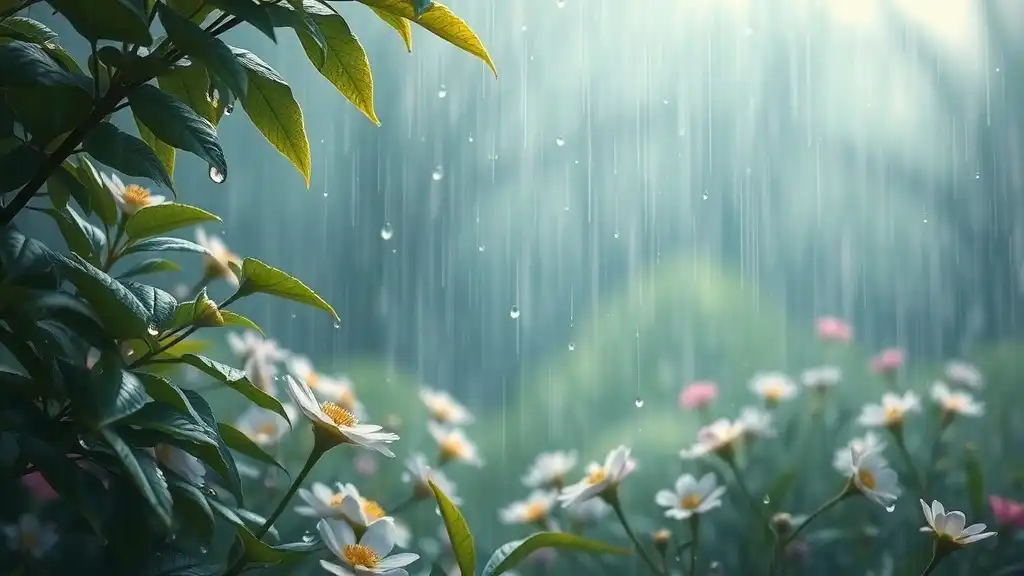Rain has long been a subject of fascination across cultures, deeply intertwined with our emotional and spiritual landscapes. It's a natural phenomenon that evokes a variety of feelings and thoughts, often seen as a symbol of life, nourishment, and even transition. In delving into the spiritual meaning of rain, we uncover the profound lessons it offers, encouraging us to reflect on our own lives and the world around us.
The Symbolism of Rain
The Cleansing Power
Rain possesses a unique ability to cleanse not just the earth but also our spirits. In many spiritual traditions, it symbolizes purification and renewal. Just as rain washes away dirt and grime, it serves as a metaphor for letting go of negativity. In the Bible, for example, rain is often depicted as a sign of God's mercy, where it cleanses the earth after a storm. This is a reminder that storms in our lives can lead to renewal; the cleansing rain can wash away old wounds, making way for fresh opportunities and clearer skies.
Growth and Fertility
Rain is deeply connected to the abundance of nature. It nurtures the earth, allowing plants to grow strong and healthy. Spiritually, this notion can be extended to our personal growth and life transitions. Just as seeds require rain to flourish, individuals often need struggles and lessons—including those embodied in rain—to achieve personal and spiritual maturation. Rain symbolizes hope and the promise of new beginnings, inviting us to embrace the seasons of our lives.
Change and Transition
Life is a series of ebbs and flows, and rain serves as a powerful metaphor for these transitions. The sound of rain can invoke feelings of nostalgia, prompting reflection on past changes. It reminds us that all things are temporary and encourages us to embrace life's unpredictability. Whether it’s the sudden spring shower or the gentle drizzle of autumn, rain invites us to reflect on our own changing circumstances, teaching us to accept life’s inherent uncertainties.

Rain in Different Cultures
Indigenous Perspectives
Across various indigenous cultures, rain carries significant spiritual weight. Native American traditions often view rain as a gift from the spirit world, essential for survival and prosperity. Rain dances are ceremonial practices that honor the spirits, expressing gratitude and seeking blessings for abundant harvests. This demonstrates a profound connection to nature, reminding us of our dependence on the earth and the elements.
Eastern Philosophies
In Eastern philosophies like Buddhism and Taoism, rain symbolizes balance and harmony. It often reflects the concept of impermanence—the understanding that everything is transient, including our emotions and experiences. The act of rain falling is perceived not just as a physical phenomenon but as a gentle reminder that every situation, whether joyous or challenging, flows as naturally as water. The rain teaches us to be present, accepting whatever comes our way without resistance.
Western Symbolism
In Western cultures, rain has varied interpretations. In Christianity, for example, it is frequently used as a metaphor for divine blessings and grace. Rain symbolizes God’s provision, infusing the earth with life and sustaining all creatures. Traditionally, rainy days can evoke a certain melancholy, prompting introspection. Understanding this symbolism allows us to embrace even the dreariest of days as opportunities for deep reflection and spiritual growth.

Personal Reflection on Rain
Meditation and Mindfulness Techniques
Incorporating the sound and sight of rain into your meditation practices can be profoundly soothing. Focus on the rhythmic pattern of raindrops as a means of anchoring your thoughts. Close your eyes and visualize the rain cleansing not only your surroundings but also your mind. You may find it helpful to use journaling prompts during or after a rainstorm to capture feelings that arise—ask yourself how the rain makes you feel, or what thoughts come to mind as you listen to its melody.
Connecting to Nature
Engaging with rain presents a unique opportunity to connect more deeply with nature. Taking a mindful walk in the rain, feeling each drop on your skin, allows you to experience intimacy with the natural world. This practice encourages presence—being fully aware of your surroundings and appreciating the beauty in each moment. As you walk, consider the ground beneath your feet, the fresh scent of wet earth, and the soothing sounds of raindrops—every sensation brings you closer to understanding your spiritual essence.

The Spiritual Lessons of Rain
Patience and Acceptance
Rain teaches us the importance of patience. It may start as a light sprinkle before transforming into a pouring downpour. Just like we must wait for the rain to nourish the earth, we often need to cultivate patience in our own lives. Acknowledge that waiting for something—whether it’s love, success, or healing—is part of the journey. This acceptance cultivates resilience and prepares us to receive blessings in due time.
Hope and Renewal
The cyclical nature of rain embodies hope. Following every storm, the earth emerges vibrant and refreshed. These cycles remind us that challenges often precede personal renewal. After periods of struggle or sadness, new opportunities for growth arise, mirroring nature’s rhythm. By recognizing rain as a symbol of hope, we allow ourselves to envision brighter days, encouraging a positive outlook even during tough times.

Conclusion
The spiritual significance of rain transcends its physical presence. It serves as a teacher, reminding us of life’s inherent beauty, transitions, and the promise of new beginnings. By embracing the lessons rain has to offer, we can cultivate a deeper connection to our spiritual selves and the world around us. The next time the sky darkens, consider it an invitation to reflect and grow—embrace the rain as it falls, knowing that it brings with it the potential for renewal and transformation.



















